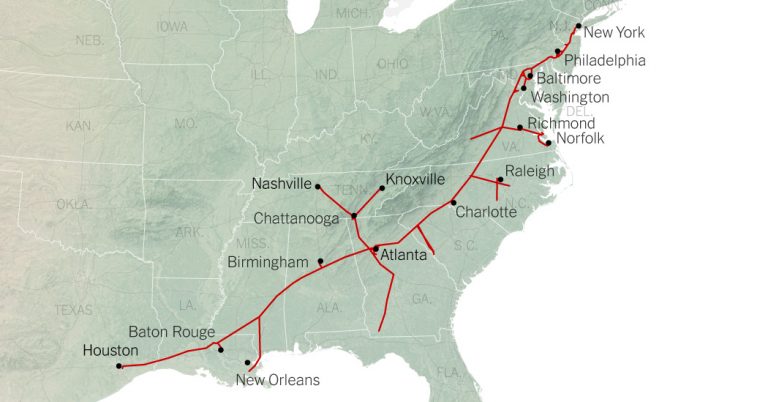
[Latest news: Colonial Pipeline restarted its operations.]
HOUSTON — The ransomware assault that pressured the shutdown of a pipeline delivering gas to the Northeastern United States highlighted the vulnerability of the American vitality system. It led governors of a number of states to declare emergencies. And it prompted panic amongst motorists as hundreds of fuel stations have run out of provide.
The operator of the pipeline, which was taken offline on Friday, has begun restoring the move of gas. However for every day that the shutdown has dragged on, a sense of disaster has grown, testing the nation’s growing older infrastructure and a new White Home administration combating rising cyberthreats.
What’s the newest?
Colonial Pipeline, the firm that runs the important artery, mentioned on Wednesday that it had restarted operations however that it might take a number of days for vitality to move usually. “Colonial will transfer as a lot gasoline, diesel, and jet gas as is safely potential,” the firm mentioned in a assertion.
In the meantime, drivers in Tennessee, Georgia and elsewhere have been panic-buying gasoline, exacerbating shortages with their fears. The value of fuel has shot up in a number of states. Motorists have been yelling at each other to maneuver out of the means as they hog pumps to replenish a number of fuel cans to hoard.
The close to hysteria in a few communities has not been seen in years, as some folks on social media have begun evaluating President Biden to President Jimmy Carter, who was president when fuel traces rattled the nation after the Iranian revolution and different Center East troubles.
Specialists say the response this time, nevertheless, is out of proportion with the precise threat.
What’s Colonial Pipeline, and why is the Atlantic Coast so depending on it?
The Colonial Pipeline, primarily based in Alpharetta, Ga., is one in every of the largest in the United States. It could possibly carry roughly three million barrels of gas a day over 5,500 miles from Houston to New York. It serves most of the Southern states, and branches from the Atlantic Coast to Tennessee.
A few of the largest oil corporations, together with Phillips Petroleum, Sinclair Pipeline and Continental Oil, joined to start building of the pipeline in 1961. It was a time of fast development in freeway driving and long-distance air journey. At present Colonial Pipeline is owned by Royal Dutch Shell, Koch Industries and several other overseas and home funding corporations.
It’s significantly important to the functioning of many Japanese U.S. airports, which generally maintain inventories enough for solely three to 5 days of operations.
There are a lot of causes it has change into so essential, together with regulatory restrictions on pipeline building that return almost a century. There are additionally restrictions on street transport of fuels.
However the foremost motive comes nearer to dwelling. Over the final twenty years, a minimum of six refineries have gone out of enterprise in New Jersey, Pennsylvania and Virginia, decreasing the quantity of crude oil processed into fuels in the area by greater than half, from 1,549,000 to 715,000 barrels weekly.
“These refineries simply couldn’t earn cash,” mentioned Tom Kloza, international head of vitality evaluation at Oil Worth Info Service.
The rationale for their decline is the “vitality independence” that has been a White Home objective since the Nixon administration. As shale exploration and manufacturing boomed starting round 2005, refineries on the Gulf Coast had quick access to pure fuel and oil produced in Texas.
How critical is the menace?
The present pipeline drawback is critical as a result of it has implications for nationwide safety, although the Northeast gas provide system is versatile and resilient.
Many hurricanes have broken pipelines and refineries on the Gulf Coast in the previous, and the East Coast was in a position to handle. The federal authorities shops tens of millions of gallons of crude oil and refined merchandise for emergencies. Refineries can import oil from Europe, Canada and South America, though trans-Atlantic cargo can take as a lot as two weeks to reach.
When Hurricane Harvey hit Texas in 2017, damaging refineries, Colonial Pipeline shipments to the Northeast had been suspended for almost two weeks. Gasoline costs at New York Harbor shortly climbed greater than 25 %, and the added prices had been handed on to motorists. Costs took over a month to return to earlier ranges.
Hurricanes come and go. However this disaster is totally different. Federal investigators mentioned the attackers had been geared toward poorly protected company information.
“The unlucky fact is that infrastructure immediately is so susceptible that virtually anybody who needs to get in can get in,” mentioned Dan Schiappa, chief product officer of Sophos, a British safety software program and {hardware} firm. “Infrastructure is a simple — and profitable — goal for attackers.”
David E. Sanger contributed reporting.